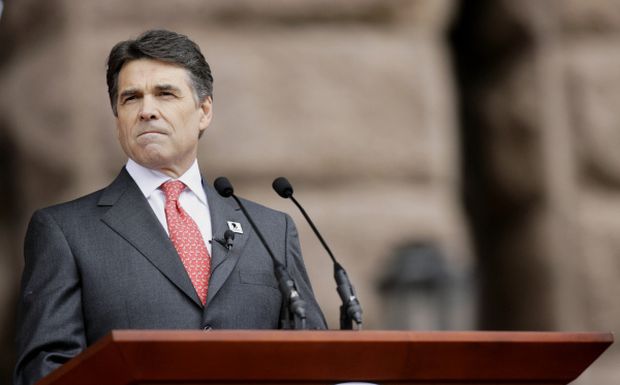Rick Perry's Land Deals: Why They Matter

Jim Geraghty replies to our blogposts on Texas Governor Rick Perry's uncannily successful land dealings:
Last year the Democrat gubernatorial candidate in Texas, Bill White, tried to make an issue of it, and Texans largely yawned. Some of these deals go back to Perry’s time as Texas Agriculture Commissioner in the early 1990s. Fascinatingly, through six statewide general election races in addition to some brutal primary fights (even by Texas standards), none of Perry’s rivals have managed to get the accusations to stick or persuaded voters that anything corrupt occurred. Throughout the 1990s, the Texas Attorney General was Dan Morales, a Democrat, who would seemingly have no partisan reluctance about investigating a bribery accusation of a Republican state officeholder.
Perhaps it is voter cynicism. Perhaps the cacophony of negative attacks in Texas politics makes voters tune out or discount all charges. Or perhaps, as Perry claims, he “did everything open and honest, at arm’s length” and there’s not enough there to justify charges, or even implicit suggestions, of corruption.
Some thoughts in reply:
1) This sequence of posts was inspired by the following remark of Jim's in his indispensable Morning Jolt email:
Look, I have no idea whether Rick Perry is the kind of guy who would get confused if you invited him into the Oval Office and told him to sit in the corner. I do know that he’s been a C-130 pilot, has made a fortune in real estate, and has been elected governor of Texas three times.
People have been talking for years about Perry's land dealings, but this was the first time I'd ever seen them cited as an affirmative credential rather than a troubling question mark.
2) I do not suggest that Perry's deals are corrupt. As Jim says, "corruption" is a term with a legal meaning: an official takes money in exchange for a political favor. Nobody has ever shown Gov. Perry to have performed any favors for those with whom he has done profitable land business. Nobody has advanced evidence that any law has been broken.
3) At the same time, it's asking a lot of the voters to believe that Gov. Perry scored these successes by acumen alone. The coincidences just pile up too thick.
So what?
Rick Perry is not the first politician to emerge from public life a lot richer than he started.
If he was offered access to sweetheart deals, again, he's not the first to accept: remember Hillary Clinton and her cattle futures?
Many governors would regard active land investment as inconsistent with their public duties, even absent insider information and sweetheart deals. Haley Barbour of Mississippi put his wealth into a blind trust when he became governor. Mitt Romney not only put his assets into a blind trust during his governorship - but then forbade his trust to invest in Massachusetts municipal bonds, to avert any appearance of impropriety.
And no, it's not just a Texas thing: George W. Bush put his assets in a blind trust when he became governor in 1994.
There's more going on here than an issue of appearance of impropriety. There's also a question about where a politician invests his time and energy. Successful real estate investing is difficult and time-consuming. Rick Perry may claim that his investments did not benefit from insider information and special favors, and as Jim notes, Texas voters have accepted his story sufficiently to elect and re-elect him. But Perry obviously cannot claim to have been 100% focused on Texas business during his many years in office.
At a minimum, the attempt to reinvent Perry's business career as a rebuttal to negative allegations about Perry's brainpower is ... let's say ... ill-advised. Perry's real-estate fortune is one of those subjects about which you'd expect Perry supporters to take the view: the less said, the better.

